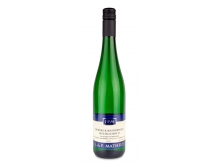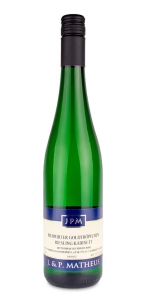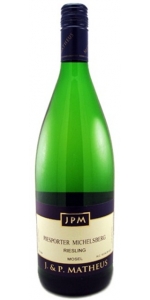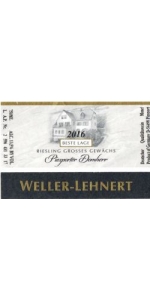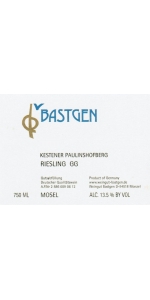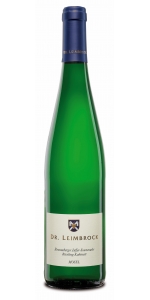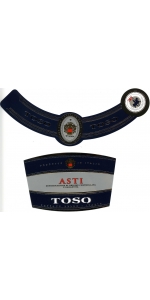Matheus Piesporter Goldtropfchen Riesling Kabinett 2021
| Country: | Germany |
| Region: | Mosel |
| Winery: | Weingut Matheus |
| Grape Type: | Riesling |
| Vintage: | 2021 |
| Bottle Size: | 750 ml |
Matheus Piesporter Goldtropfchen Riesling Kabinett is made from 100 percent Riesling.
This Goldtröpfchen ranks as an unofficial "Grand Cru" delivering light floral and fresh Kabinett style wines.
Their later harvest wines, Spatlese and Auslese, tend toward apricot flavors, honeyed notes and superb intensity. All grapes are grown on Devonian slate.
Enjoy with slightly spiced sushi or moderately spicy Indian cuisine such as chicken Vindaloo.
Matheus Piesporter Michelsberg Riesling is made from 100 percent Riesling.
QBA stands for "Qualitätswein bestimmter Anbaugebiete", which means that the wine comes from one of the 13 designated wine regions.
A beautiful wine with delicate perfumed aromas. Medium bodied, well balanced, filled with peaches and green apples, crisp and fresh acidity.
Weller-Lehnert Piesporter Domherr Grosses Gewachs Riesling is made from 100 percent Riesling.
Made in accordance with the stringent production criteria of the classification of the Bernkasteler Ring, wines with the designation “Grosses Gewächs Bernkasteler Ring” represent the premium line of the association’s dry wines. These Grand Crus can only come from the best sites of the steep slopes and are distinguished by their exceptional aging potential. To be awarded the status of “Grosses Gewächs”, selective hand-harvesting, a restriction of yields to 50 hl/ha and the passing of a stringent sensory examination by a highly qualified professional panel are required.
Piesporter Domherr is the ancient and original Piesporter Goldtröpfchen. It lies in the heart of Piesporter Goldtröpfchen right by the Mosel River. It consists of 4 hectares that are south-southeast facing.
The locatio on the river creates a mirror effect, offering optimum conditions for the production of outstanding mineral wine with fine, fruity elegance. Because of its prolonged vegetation period, Riesling (frequently referred to as the “queen of white varieties”) is often capable of expressing the characteristics of its terroir like no other.
Bastgen Kestener Paulinshofberg Riesling Kabinett is 100 percent Riesling.
Kesten is a small village right by the Mosel surrounded by steep vineyards called Paulinsberg (=hills of Saint Paul). The vines grow on bridle clay slate near the river - a classic terroir that has been cultivated with vines ever since Roman times. Riesling is the most typical grape of the Mosel region that produced a fruity Kabinett with beautiful peach aromas on the nose, rich and ripe fruits on the mouth with honeyed notes and a refreshing acidity. This is a very pleasing wine.
They meticulously tend 4.5 ha (11.11 acres) of which 80% is Riesling. The soil is made of slate. Their vineyards are located in Kesten and Brauneberg, on a steep terrace, and planted to 50-year old vines. Fortunately for Bastgen, they own part of the famous Brauneberger Juffer Sonnenuhr. The vines produce very small, ripe berries that are very tasty.
The grapes are strongly selected, only minimal amounts of botrytis are tolerated. At time of the harvest the grapes are fully ripened with a golden color and tart acidity. After a natural sedimentation process the fermentation occurs in stainless steel tanks under cool conditions. The wine remains on the lees until April, then is gently filtered once, and bottled.
Dr. Leimbrock Brauneberger Juffer Sonnenuhr Riesling Kabinett is made from 100 percent Riesling.
Brauneberger Juffer and Juffer-Sonnenuhr are one of the most prestigious vineyards in the winegrowing region Mosel. The vineyard faces south and provides best conditions to plant the Riesling vines.
Juicy and aromatic with a wonderful drinking flow and aromas of melon, stone fruit and apple. Makes you want the next sip.
ABV: 9.1%
TA: 7.5
RS: 36.5 g/liter
Dr. Leimbrock Brauneberger Juffer Sonnenuhr Riesling Kabinett is made from 100 percent Riesling.
Brauneberger Juffer and Juffer-Sonnenuhr are one of the most prestigious vineyards in the winegrowing region Mosel. The vineyard faces south and provides best conditions to plant the Riesling vines.
Juicy and aromatic with a wonderful drinking flow and aromas of melon, stone fruit and apple. Makes you want the next sip.
ABV: 9.1%
TA: 7.5
RS: 36.5 g/liter
Matheus Piesporter Goldtropfchen Riesling Kabinett is made from 100 percent Riesling.
This Goldtröpfchen ranks as an unofficial "Grand Cru" delivering light floral and fresh Kabinett style wines.
Their later harvest wines, Spatlese and Auslese, tend toward apricot flavors, honeyed notes and superb intensity. All grapes are grown on Devonian slate.
Enjoy with slightly spiced sushi or moderately spicy Indian cuisine such as chicken Vindaloo.
The Weingut Matheus Estate
Weingut Matheus is located in Piesport on the Mosel and has a 400 year tradition of winemaking (8 generations). Since 1992, the estate has been managed by Petra Hain-Matheus and Jorg Matheus, a graduate of the school in Geisenheim. Total estate production is 35,000 bottles or 2,916 cases annually, but they could produce more (50,000 bottles).
The Weingut Matheus Vineyard
Currently, they make wine from 13.6 acres of vineyards located in such sites as:
- Piesporter Goldtröpfchen (4.5 acres)
- Piesporter Treppchen
- Dhroner Hofberger
- Wintricher Ohligsberg
Toso Asti Spumante is made with 100 percent Moscato d' Asti
Sweet, aromatic, fruity and floral sparkling wine, moderate in alcohol, with fine sparkle and long lasting perlage. Of yellow straw color, it is a fine and elegant wine, ideal to celebrate every joyful event.
Toso Asti Spumante is made from Moscato grapes grown on hills in the South of Piedmont An early picking insures a higher acidity and a more floral bouquet. The grapes are crushed immediately to avoid any oxidation which might detract from the wine's aromas. The grapes are gently crushed and the juice is settled, centrifuged and filtered. The purified musts are placed in stainless steel tanks and held at near freezing temperatures which blocks completely any fermentation. This enables the producers to draw batches of fresh must whenever they decide to bottle. The batch of must is then inoculated with special yeast and fermented in an autoclave to retain the naturally produced carbon dioxide. The fermentation is stopped by a rapid chilling when the wine reaches the desired ratio of alcohol (standardly 7%) to residual sugar ( 3-5% ). The wine is then filtered, bottled and, at Toso, immediately shipped to ensure the freshest product possible.
Fresh, a floral bouquet, a sweet, fruity taste, Excellent as aperitif, best enjoyed with fruit, dried pastries and desserts in general.
- back
This is a 6 pack with 2 bottles each from vintages from 2013, 2015, and 2016.
***Tenimenti Angelini Val di Suga Vigna Spuntali Brunello di Montalcino 2016:
The 2016 Vigna Spuntali Brunello di Montalcino is the most brooding of the lineup from Val di Suga and is sourced from the southwest of the region on sandy soils. There are aromatics of black raspberry, licorice, menthol, sage, cinnamon, and iron-rich earth. Its Mediterranean influence is felt on the palate with ripe black cherry, dried herbs, and sun-baked earth. This is the fullest bodied and most savory of the Val di Suga lineup, with more roundness and grip. Its structure will benefit from cellaring for several years and will be great drinking over the next 20 years or more. 2026-2040.
-Jeb Dunnuck 96 Points
***Tenimenti Angelini Val di Suga Vigna Spuntali Brunello di Montalcino 2015:
The 2015 Vigna Spuntali Brunello di Montalcino is more introverted on first opening, with notes of black plum, licorice, dried Mediterranean herb, and sun-baked earth. On the palate, it offers a tart dried fruit character, with a building tannin structure that finishes with tomato leaf, and bitter herbs. The most rustic and burly of the wines in the lineup of the 2015 Val di Suga vintage, it will benefit from allowing some time in cellar to see how this matures and its tarriness develops. Drink 2026-2036
-Jeb Dunnuck 94 Points
***Tenimenti Angelini Val di Suga Vigna Spuntali Brunello di Montalcino 2013:
Plenty of spices and fresh herbs on the nose, such as dried rosemary and nutmeg, to match the underlying dried redcurrants and cranberries. Full-bodied with plenty of concentration, but still shows a very sturdy, tannin backbone and punchy acidity, to drive this through to a long finish. Drink in 2021.
-James Suckling 94 Points
Intense ruby color of high layer with garnet edge, clean and shiny. Intense nose that, from the beginning, transmits complexity, penetrating, with aromas of black fruits, blueberries and currants, undergrowth, roasted memories, toffee, coffee powder, liquorice, cloves, vanilla and lebanese cedar. Mouth with freshness and balance, with tannins ripe and creamy, which highlight its elegance, with a step harmonious and intense. Long and pleasant aftertaste, with a great variety of balsamic and spicy memories.
Review:
Complex but neat and vivid, with outstanding depth and vibrancy at the same time. White pepper, nettles, red berries, chalk, minerals and spices. Full-bodied and so cohesive and chalky on the palate, with a long, broad, dusty finish. The slight warmth in the finish does not affect the greatness of this Ribera del Duero. Drink or hold.
-James Suckling 95 Points
-

